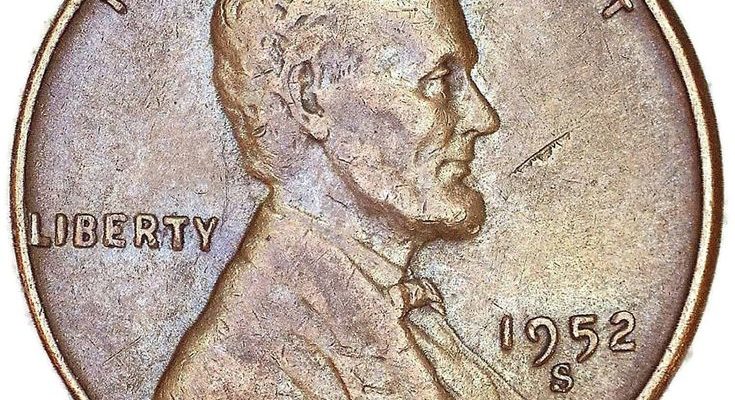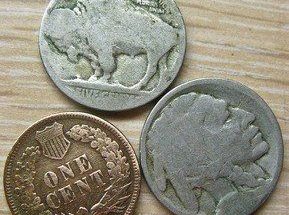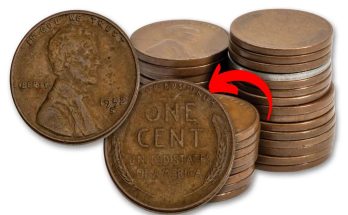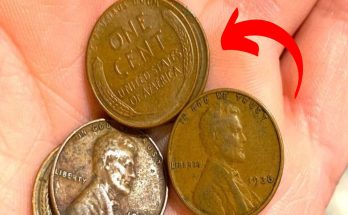Whether you are a coin collector or simply have a lot of old pennies lying around, you probably want to know how much they are worth! Specifically, the 1952 Wheat Penny value. While these pennies are common and have a high mintage total, most are worth at least double face value.
However, there are a few different things to look out for that may signify your coin is worth a lot more!
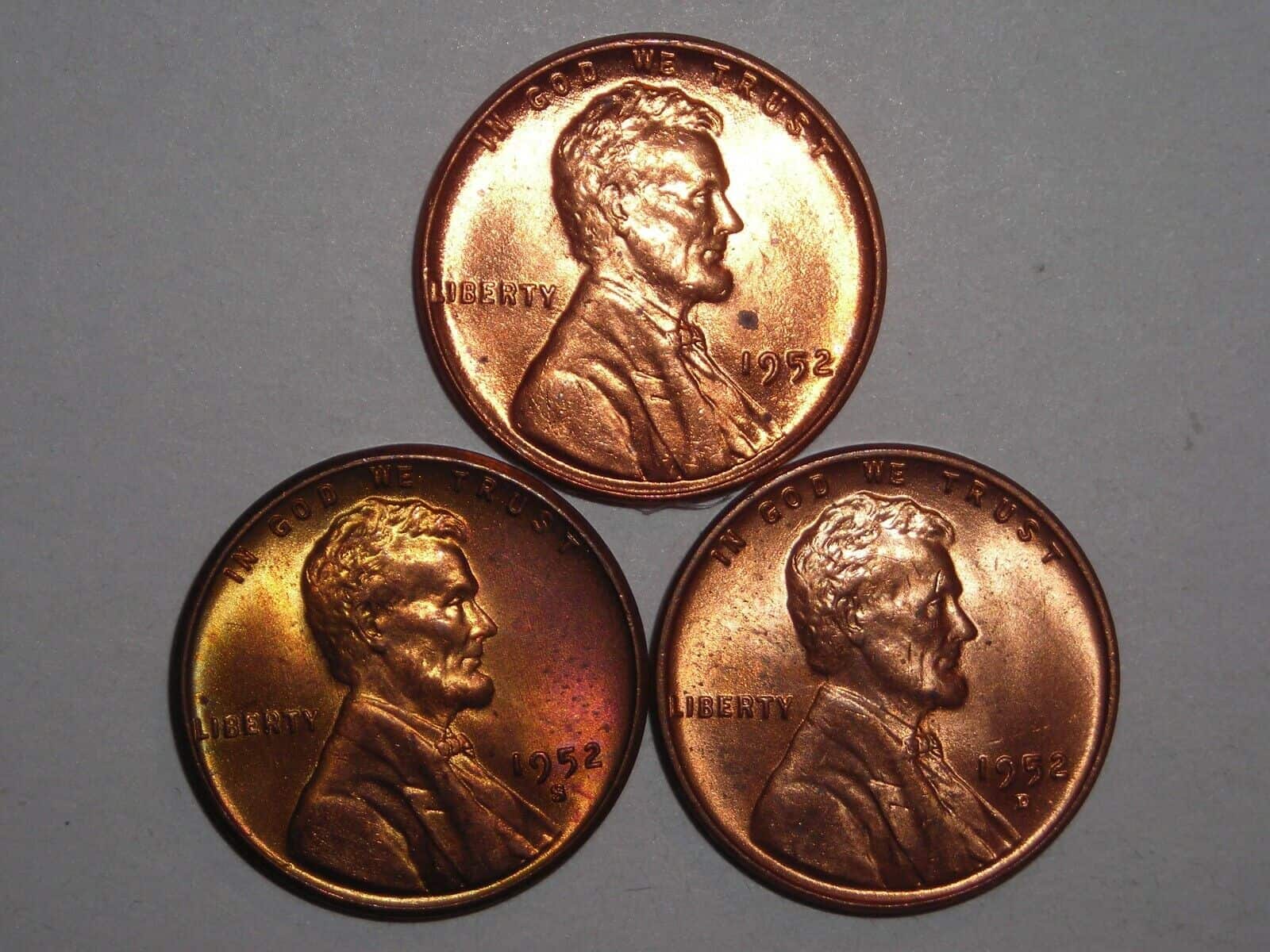
1952 Wheat Penny Details
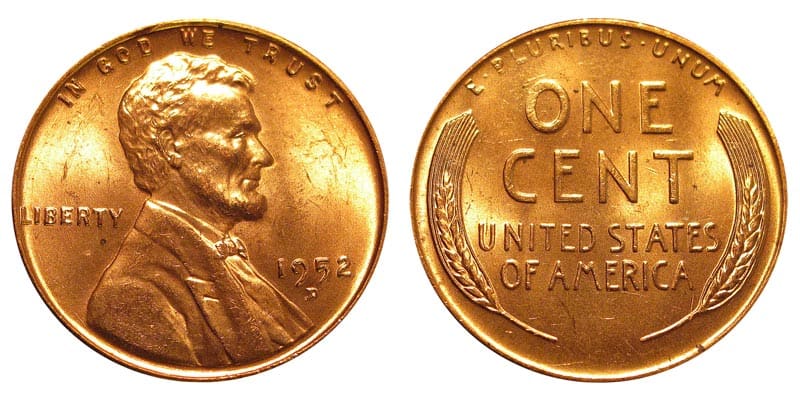
- Category: Lincoln Penny
- Mint: Philadelphia, Denver, San Francisco
- Mintage: 800,786,984
- Designer: Victor David Brenner
- Edge: Plain
- Composition: 95% copper, 5% zinc & tin
- Weight: 11 gr
- Diameter: 19 mm
- Thickness: 1 mm
The 1952 Wheat penny, also known as a Lincoln Wheat Penny, was designed by Victor D. Brenner and minted in three different cities: Philadelphia, Denver, and San Francisco. The original 1952 wheat penny was minted in Philadelphia and contained no mint mark. The other two 1952 Wheat Pennies, the 1952-D Wheat Penny and the 1952-S Wheat Penny can be determined by the lettering underneath the date based on the location it was minted.
The 1952-D wheat penny has a “D” located under 1952, while the 1952-S Wheat Penny contains an “S.” While the value of these coins ranges drastically, their value is based on the condition and whether or not the penny contains errors. These coins fall into four different categories: Good, Fine, Extremely Fine, and Uncirculated.
Circulated pennies are usually worn, falling into the “Good” and “Fine” categories. You can often tell if a wheat penny falls into the less than Extremely Fine category by the flatness of Lincoln’s features, as well as the dullness and flattening of the date. These are also sometimes referred to as being in average circulation, meaning they have been circulated and used instead of being stored and, therefore, less valuable.
Wheat pennies dated after 1950 in average circulated condition are usually only priced at base value, only a few cents in value. However, 1952 wheat pennies featuring a defined “S” are often worth more, even in average circulated conditions.
The next category is the Extremely Fine category; these coins usually only exhibit small amounts of wear. Lincoln’s features are only starting to flatten at the top of his head, but he remains primarily defined in terms of his rounded frame. You may also note that differences in the hair curls behind his ears are beginning to blend somewhat with his ear. Overall, the date and image remain well-defined and maintain minimal dullness.
Lastly, the uncirculated grade has the highest value. These coins contain most of their original luster, being shiny and defined. Wear is very minimal. However, some slight wear to the definition of the image of Lincoln is acceptable, such as the subtle smoothness of the top of his temple. Overall, the image and date are well defines and bold.
The total mintage of these coins makes them common, and they do not fall into the “rare” category! However, some professionally graded coins are valued much more, depending on a few factors. Coins typically fall between MS-60 and MS-70, with MS70 being in perfect condition with no wear and its luster still intact.
Even though the typical range for 1952 Wheat Pennies is between $.02 and $55, the highest price for one of these coins was $9,775. The coin was issue certified by the PCGS (Professional Coin Grading Service) and was graded an MS-67!
1952 Wheat Penny Value Chart
| Mint Mark | Good | Fine | Extremely Fine | Uncirculated |
| 1952 No Mint Mark Wheat Penny Value | $0.02 | $0.05 | $0.17 | $0.28-$55 |
| 1952-D Wheat Penny Value | $0.02 | $0.05 | $0.17 | $0.28-$2.28 |
| 1952-S Wheat Penny Value | $0.03 | $0.08 | $0.22 | $0.22-$4.52 |
1952 Values and Variety Guides
1952 No Mint Mark Wheat Penny Value
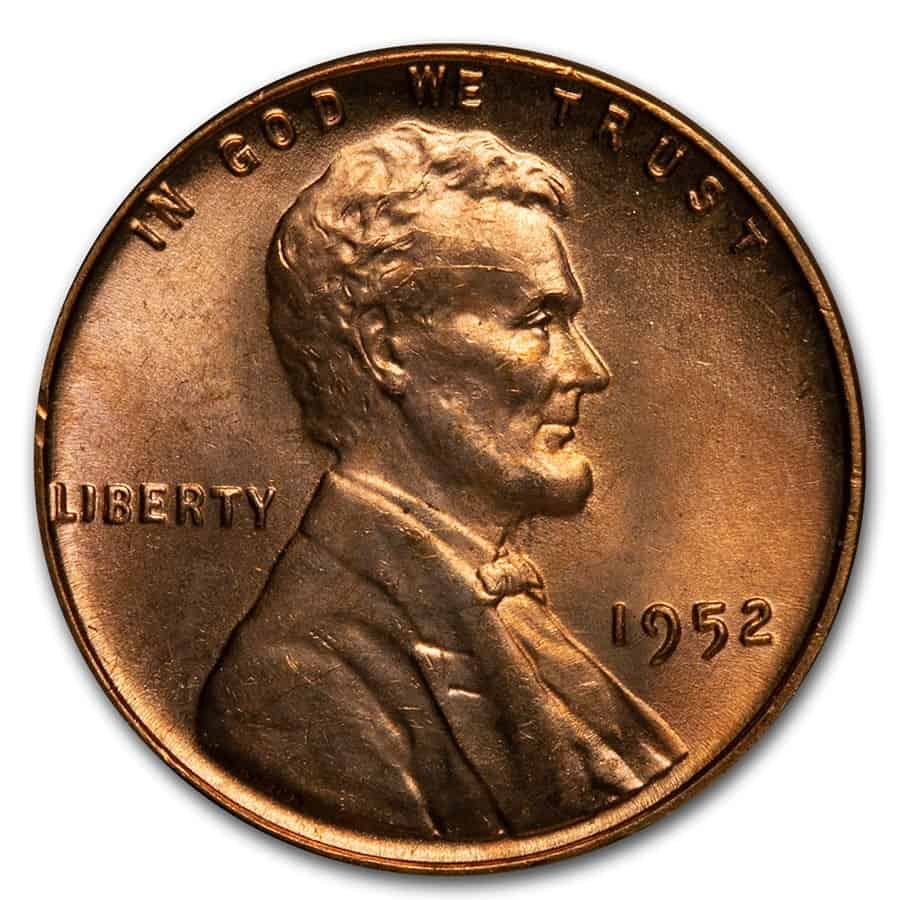
- Type: Lincoln
- Edge: Plain
- Mint mark: None
- Mint Place: Philadelphia
- Mint Year: 1952
- Face Value: $0.01
- Price: $0.02-$55
- Quantity Produced: 186,775,000
- Designer: Victor D. Brenner
The number of coins struck in Philadelphia in 1952 is 186,856,980, making it very low on the value scale. You can tell these pennies apart because they contain no mark under the date. Most of these pennies in circulation are moderately to severely worn with extensive brown toning. Hints of red inside the letters indicate that the coin was preserved at some point to prevent additional wear and tear.
These coins that were put up are more visually pleasing, therefore, worth more to coin collectors than the coins that are significantly worn. You want to look for an overall brightness in the coloring, especially surrounding the imaging and letters.
One thousand nine hundred fifty-two wheat pennies in circulation range from $0.02-$0.17, but uncirculated coins can run as much as $55 if they are in outstanding condition. If you are lucky enough to have an uncirculated 1952 Wheat Penny with a grade of MS-67 or higher with reddish toning intact, you could be looking at a price of $1000 to $1,600 on average.
1952-D Wheat Penny Value
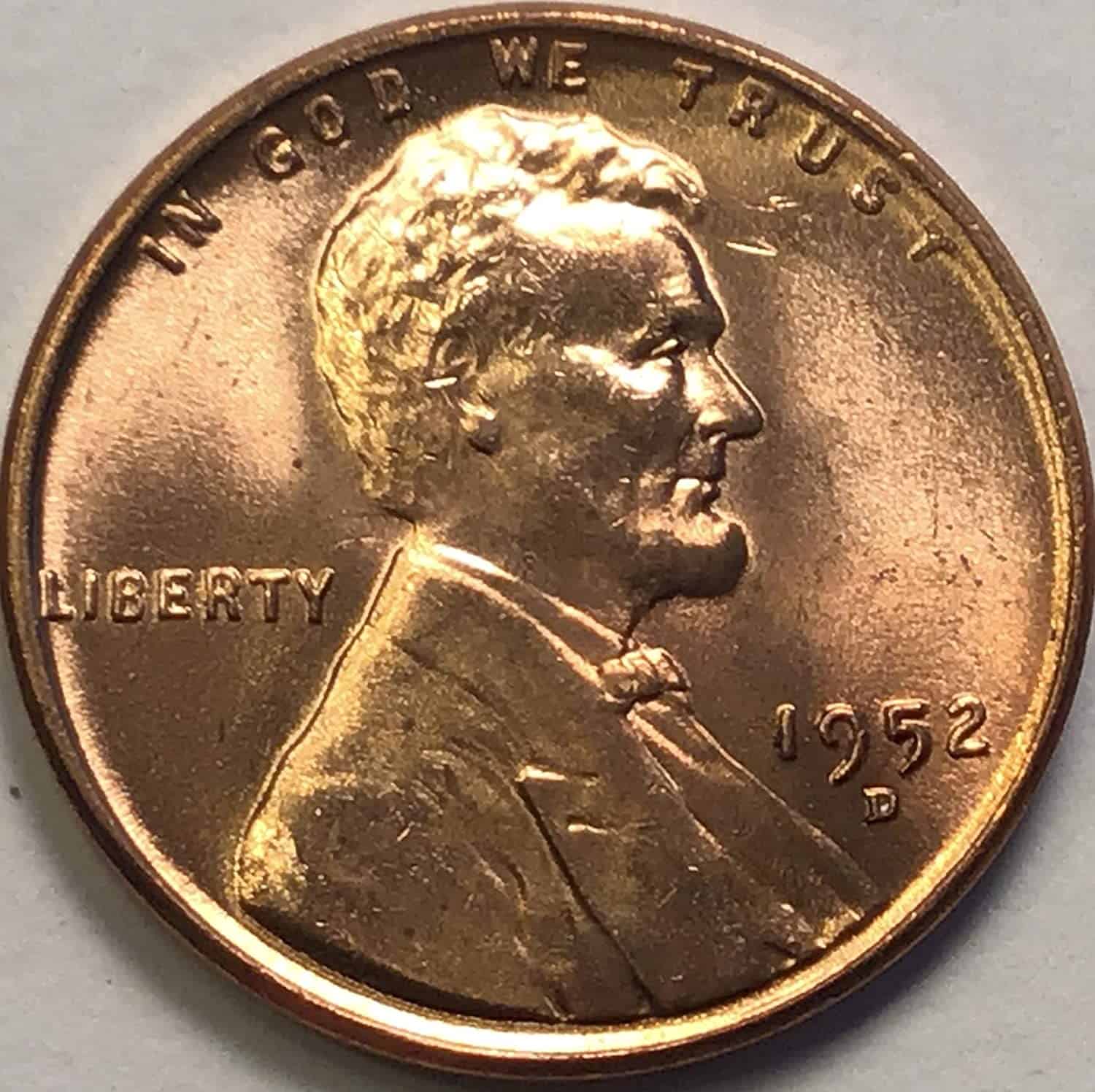
- Type: Lincoln
- Edge: Plain
- Mint mark: D
- Mint Place: Denver
- Mint Year: 1952
- Face Value: $0.01
- Price: $0.02-$2.28
- Quantity Produced: 186,775,000
- Designer: Victor D. Brenner
Denver produced quite a bit more pennies in 1952, totaling 746,130,000, making it the highest number in the series! The high mintage number also makes the 1952-D wheat penny even less rare than the no-mint mark pennies from Philadelphia.
However, there are a few errors surrounding this coin that we will go over later on in the article that adds value. The 1952-D Wheat Penny is sought out by new collectors due to its relative affordability for even uncirculated coins with a high mint state. The highest value of one of these pennies is around $45, but this is only for an extremely high mint state with a substantial amount of reddish toning.
1952-S Wheat Penny Value
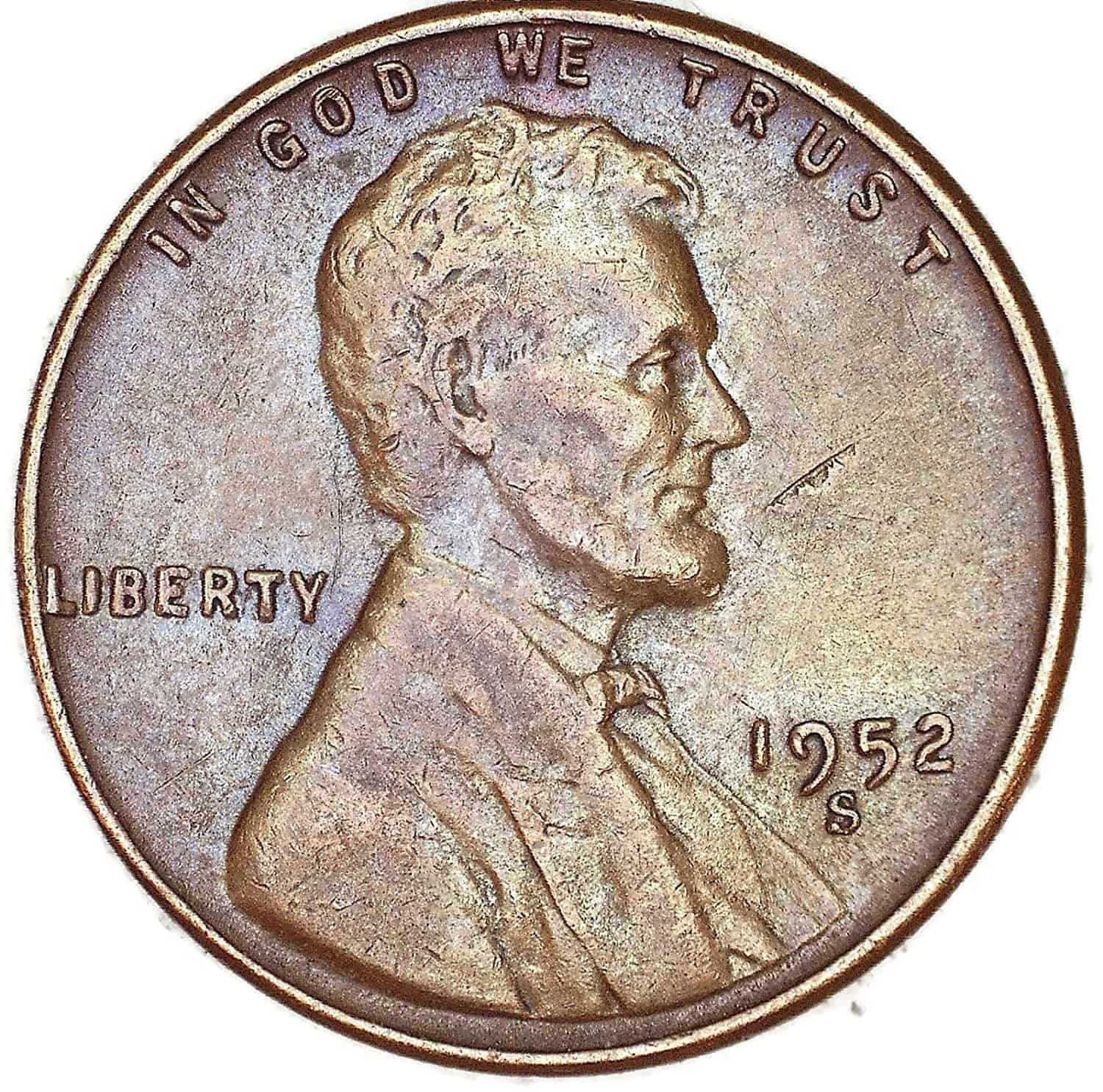
- Type: Lincoln
- Edge: Plain
- Mint mark: S
- Place of minting: San Francisco
- Mint Year: 1952
- Mint Place: $0.01
- Price: $0.03-$4.52
- Quantity Produced: 137,800,004
- Designer: Victor D. Brenner
Lower than Philadelphia and Denver, San Francisco only produced 137,800,004. This means it is rarer than the other two varieties but still less rare than other coins minted. However, finding these coins in good condition can prove to be a feat.
If found in excellent condition, they are worth between $.05 and $4.52 on average. This variety should remain bold and defined on both sides as well as maintain substantial amounts of reddish tint with minimal toning. If you find one of these coins that have been well preserved with almost no wear, it could be valued between $120 to $145.
1952 Wheat Penny History
The first wheat penny to be minted was in 1909 and was made to replace the Indian head penny. These coins are also known as Lincoln Wheat Pennies because they were designed to celebrate President Lincoln’s birthday! There were 37 billion wheat pennies that had been minted by 1952, and the stamp continued to circulate until 1959.
The penny is characterized by an image of President Lincoln on the obverse and two pieces of wheat on the reverse side. It was originally meant to be designed by Augustus Saint-Gaudens, but the designer fell ill before he could design the coin. The mint then hired Victor D. Brenner to design the coin that would remain in circulation for 40 years!
Coin collectors consider Lincoln Wheat pennies dated in the 1950s to be one of the best pieces to add to our collection. This is due to the fact that it wasn’t until 1952 that coin collecting came to be known as a hobby as well as an investment. This is also the time period in which the magazine Numersistic News established its foothold in the coin-collecting world and created the first coin-collecting newspaper.
The designer of the Indian head penny was supposed to redesign the penny. However, the design never wound up on the pennies. The wheat mint was replaced after 1909 with the lincoln memorial on the reverse side and lasted until 2009 when the Lincoln Bicentennial Series replaced it.
1952 Wheat Penny Grading
Coin grading is the process in which coins are assessed according to particular criteria based on the Sheldon scale, which measures coloring, amount of wear, and rarity. Although coin grading is a matter of opinion, professional coin graders are usually able to verify the value of a coin based on these factors.
1952 Wheat Penny Errors
1. 1952 Wheat Penny doubled die
Doubled die pennies are the result of machine doubling, a striking defect that causes parts of the coin to appear doubled. Sometimes, a doubled-die penny can be worth money, such as the 1955 doubled-die penny. However, this is different from the 1952 Wheat Penny. In order for a doubled die coin to be valuable, it has to be sought after by collectors, which is usually only the case if the defect is rare.
2. 1952 Wheat Penny Off-Center
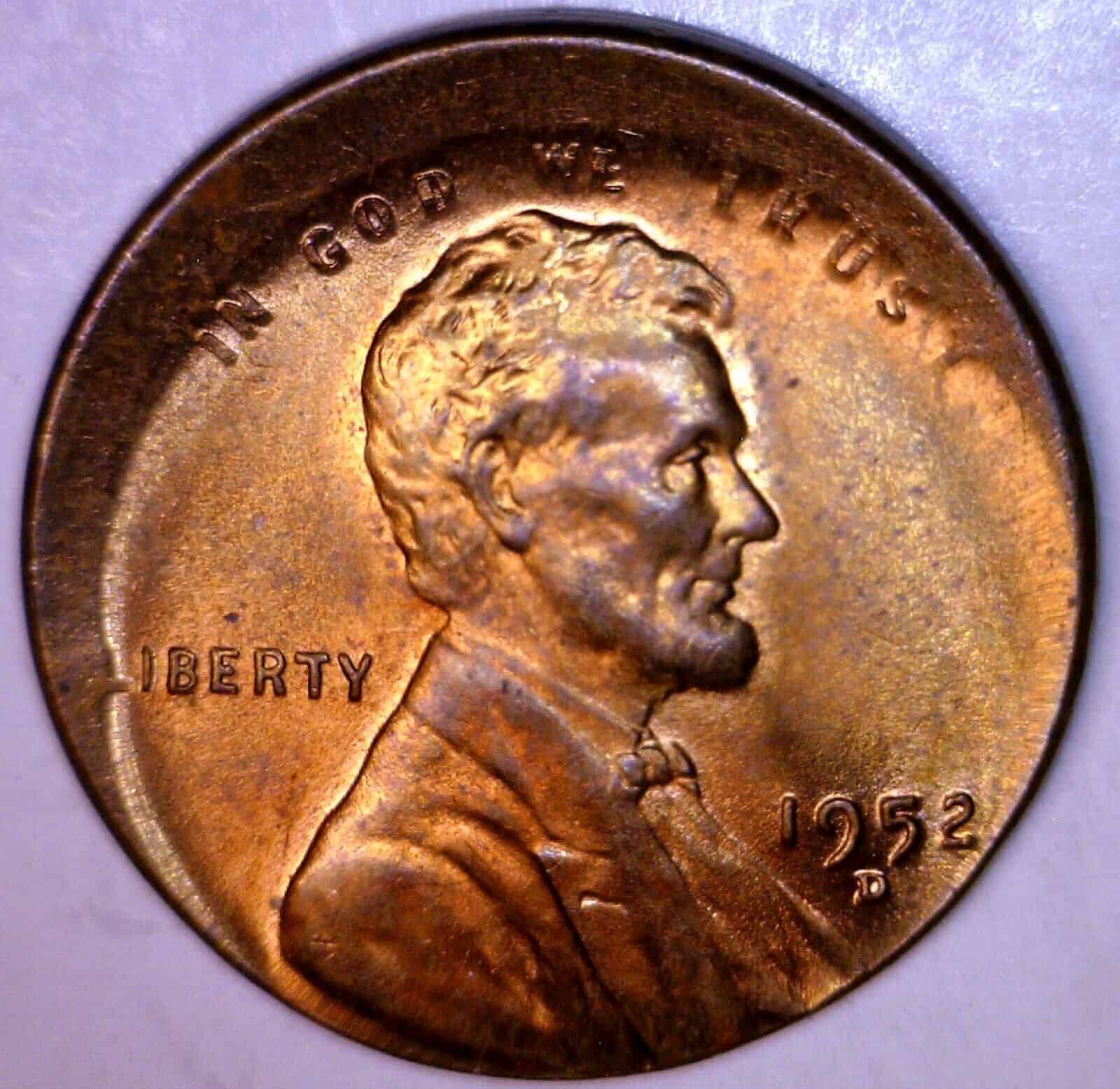
One error to look for in a 1952 Wheat penny is off Center strikes which have a very high value. This error is seen in some 1952-D Wheat Pennies, and collectors seek after these pennies. This error occurs due to misalignment while the striking process is taking place. These errors are usually observed during quality checks. However, some make it through circulation. These coins still hold the date along with a portion of Lincoln’s silhouette and are considered a 10% off-center wheat.
3. 1952 Wheat Penny Re-punched Mint Mark
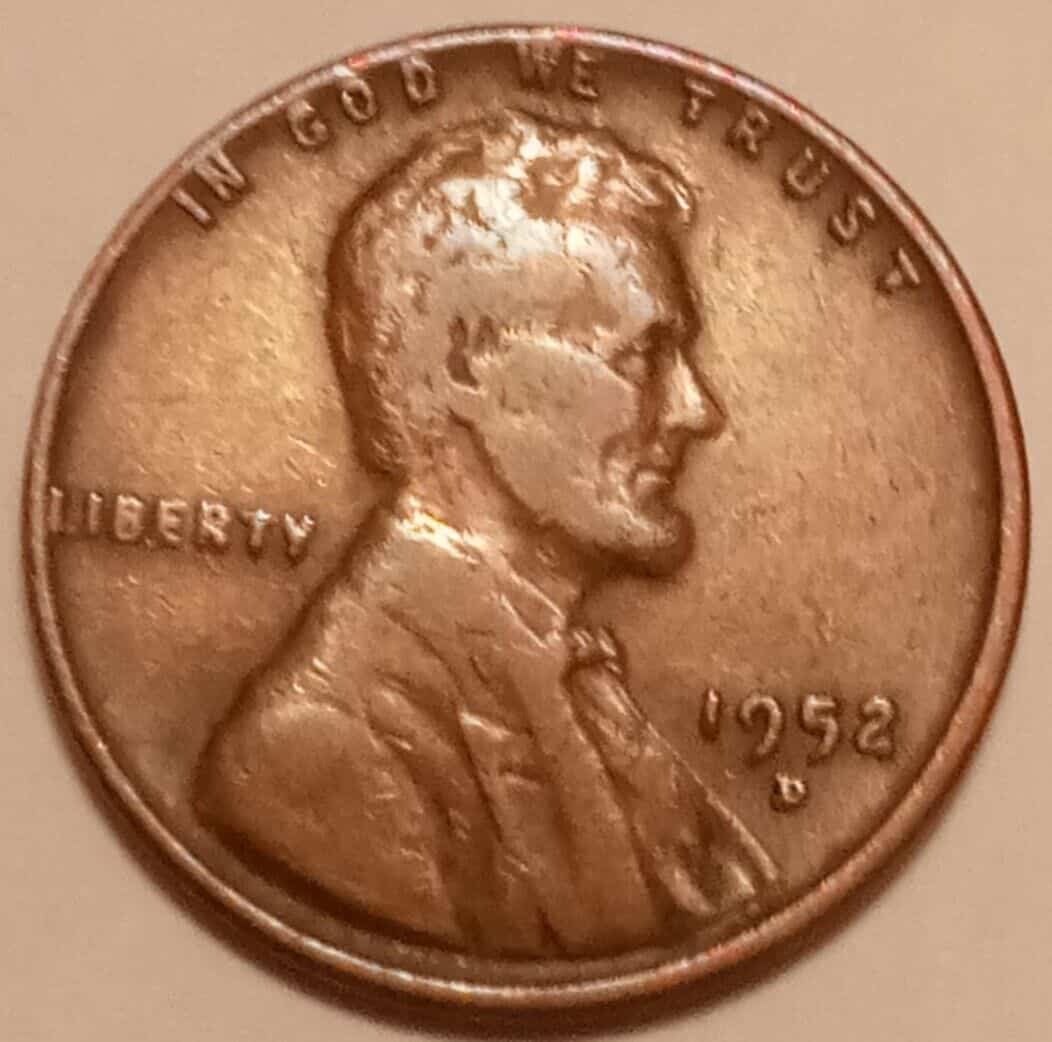
The re-punched mint is another common error seen with the 1952 Wheat penny, but only with the 1952-D variety. As the name implies, this error is a result of the wheat penny being punched twice. You can tell this penny apart by the slight appearance of an “S” right underneath the “D” mark. Due to their rarity, these coins are considered a bit more valuable than 1952-D Wheat Penny coins without the error.
